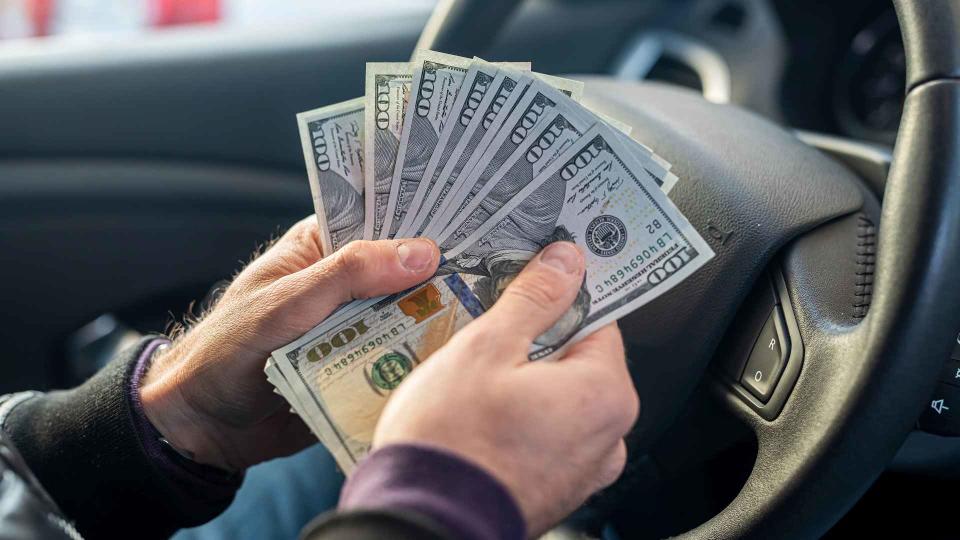If you find yourself in a position where you need to withdraw a significant amount of money from your bank account, like $5,000 in one shot, it’s important you know what that entails.
Find Out: How Much Money Do Americans Have in Their Bank Accounts in 2024?
Read Next: 5 Genius Things All Wealthy People Do With Their Money
“First and foremost, you should always be aware of the daily withdrawal limits that your bank or specific checking account has,” said Carter Seuthe, CEO, Credit Summit Debt Consolidation. “Most will allow more than $5,000 to be withdrawn at once, but not all will, so it’s important to learn the limits of your account before attempting a transaction this large.
“You should also understand that large transactions have the potential to be reported. In most cases, a $5,000 withdrawal won’t be instantly reported, however it may be analyzed for suspicious activity,” he said.
Here are more factors to keep in mind before withdrawing $5,000 from your checking account.
Sponsored: Owe the IRS $10K or more? Schedule a FREE consultation to see if you qualify for tax relief.
It May Raise Red Flags With the Bank
“Withdrawing more than $5,000 may raise flags but it depends on your history with the bank and your activity,” said Erwin Vico, CEO of Slick Cash Loans.
“In my case, they don’t give it a second thought but they don’t like people walking out of a branch with $5,000,” he explained. “They will ask if you would like an official cheque instead as cash is untraceable and cannot be recovered, nor canceled, whereas a cheque can be traced, recovered, and canceled.”
You’ll Be Walking Around With a Lot of Cash
Although it might sound obvious, according to David Bakke, finance expert at DollarSanity, if you withdraw more than $5,000 from your checking account, you’ll be walking around with a lot of cash.
“You can never be too careful these days so if you need to do that, don’t tell anyone. It’s also advisable that you use that money as quickly as possible.”
Check Out: 10 Expenses Most Likely To Drain Your Checking Account Each Month
You Might Not Be Able To Do It From an ATM
“Most banks have caps on what you can withdraw from an ATM each day, and typically $5,000 is more than those limits,” Bakke said. If you need to take out that kind of money, it will be a lot easier if you do it in person.”
The Limit You Need To Worry About Is $10,000
“$5,000 is okay, but if you withdraw more than $10,000, the transaction will bereported to the IRS and at least one other government agency,” Bakke said. “You will also normally be required to fill out Form 8300.
“There’s nothing to worry about, just a bit of an inconvenience. That’s assuming that the reason you’re withdrawing that much money is for above-board and legal reasons,” he said.
It Could Affect Your Credit Score
“As someone deeply versed in finance, I urge you to consider a few genuine points before withdrawing over $5,000 from your checking account in one go,” said Alyssa Huff, financial expert and the owner of Sell House As Is.
For example, she urges you to think about how such a move might impact your credit score.
“Even though it won’t directly affect it, sudden large transactions could raise eyebrows among lenders, possibly affecting your ability to borrow in the future.”
It Could Trigger Audits From the IRS
According to Philip Wentworth, Jr., co-founder of Rockerbox Tax Solutions, when considering withdrawing more than $5,000 from your checking account, one often overlooked aspect he observes is the potential signal it sends to your bank and, possibly, to the IRS.
“Although such transactions are not directly reported unless they exceed $10,000, they can still be flagged as suspicious activity, especially if they occur frequently or without clear rationale,” he explained.
“In our practice, we’ve advised clients on maintaining transparent records of their transaction purposes to avert any unnecessary audits or inquiries.”
You Could Be Targeted for Financial Fraud
“One critical angle we’ve encountered in our work is the risk of identity theft and financial fraud associated with large withdrawals,” said Jenna Trigg, co-founder of Silver Fox Secure.
“When amounts exceeding $5,000 are withdrawn, it’s not only about the transaction itself but ensuring the security of the funds thereafter.”
“We’ve seen cases where seniors became targets for fraudsters after making substantial withdrawals,” she highlighted.
“Implementing robust identity theft protection and credit monitoring immediately following such withdrawals can be a vital step in mitigating these risks,” Trigg added. “These measures serve as a critical defense layer, guarding against unauthorized access and ensuring the individual’s financial safety.”
More From GOBankingRates
7 Home Items To Avoid Buying in 2024
How To Retire on $2,000 a Month: A Frugal Living Guide
One Simple Way to Earn More on Your Savings in 2024
The Biggest Mistake People Make With Their Tax Refund -- And How to Avoid It
This article originally appeared on GOBankingRates.com: 7 Things You Should Know If You Withdraw More Than $5,000 From Your Checking Account
